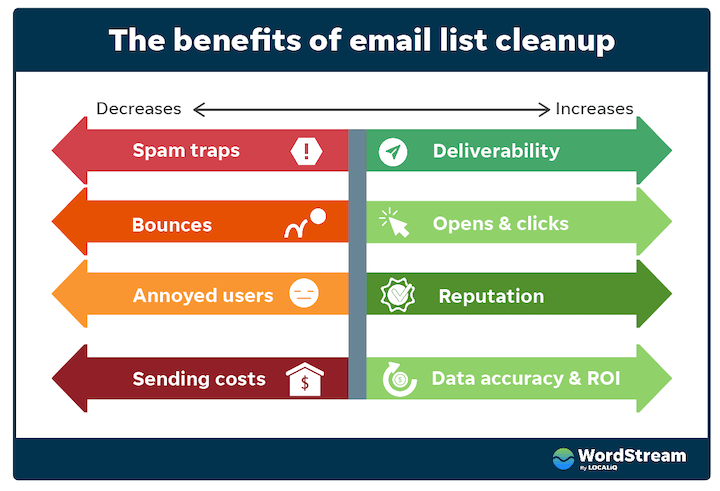Best Advice For Picking A Family Medicine Email list
Best Advice For Picking A Family Medicine Email list
Blog Article
What Are The Most Important Things To Consider When Buying Cpa Email Lists?
To make sure that your CPA (Certified Public Accountant) email list is in compliance with the law, and is relevant and of high-quality, it's important to assess the following key elements. What you should consider is:1. Data Accuracy and Quality
The source of the data: Confirm the source of the information. Trustworthy suppliers typically collect data from sources like databases, professional directories, as well as trade associations. Avoid lists compiled through scraping or any other method that is not reliable, as they may include outdated or incorrect information.
Verification Process - Check whether the email address list was recently verified. This will help reduce bounce rate and make sure you are able to reach active, valid email addresses. Check how often this list is updated and cleaned because CPAs often change companies or even jobs.
Segmentation and Filters - A good CPA list will have different options for segmentation, such as location, industry specialization, years of experience or size of the firm. Your advertising campaigns are more relevant through targeted targeting.
2. Conformity to Legal Regulations
Data Privacy Laws – Ensure your email list complies the law on data protection, such as the General Data Protection Regulation, the California Consumer Privacy Act or any other local laws. The list must contain the email addresses acquired legally and only with consent.
Conformity with the CANSPAM Act In order to be in compliance with the CANSPAM Act which regulates commercial email it is crucial that your email list conforms to the CANSPAM Act. This includes implementing opt-out methods and not using deceptive subject lines or other content. Non-compliance may lead to legal and financial issues.
Opt-in Consent: Check that email addresses were acquired via opt-in consent. This means that the recipient consented to receiving marketing emails from third parties. This decreases the likelihood of receiving spam complaints, and also increases engagement.
3. Provider Reputation
Examine the reputation of the service. Look through reviews, case studies, and testimonials to gauge the experience of past customers. Proven providers with an established track history are more likely to offer quality and reliable data.
Transparency: The service provider must be clear about how the data was gathered and the frequency at which it is up-to-date. If the provider's methods are not explained clearly, it is a big red warning.
Customer Support: If you require assistance with list customization troubleshooting or understanding compliance rules It is essential to provide a reliable customer support. A good support system can save you time and effort throughout the campaign.
4. Cost and Return on Investment
Pricing Models: Different companies have different pricing plans. Some charge per contact, others a flat fee or subscription. Review costs against ROI and balance price with high-end.
Refund Policy: Find out whether there is a procedure to refund or replace items in the event that a number of emails were not correct or invalid. A guarantee can give peace of mind.
Cost vs. Value: Don't concentrate only on price. It's tempting to choose a less expensive list, however if its quality isn't good this could lead to low engagement and large bounce rates. Spend money on lists that offer value in terms of data precision and segmentation.
5. Ownership and use of data
Purchase the list one time or purchase it several times. Costs for databases that are solely used might be less expensive, however you will have greater flexibility over the long term if you buy the data.
Exclusive vs. Shared lists: Check if your email list is just for your company or if other buyers are also able to access it. Shared lists could lead to audiences becoming fatigued if they are bombarded by marketing emails.
6. Data Integration and Format
CRM Compatibility: Ensure that the list is in a format that works with your CRM or email marketing software, such as CSV or Excel. This allows for easy managing data and import.
Ease of Use: Evaluate the ease at which the data can be divided and manipulated once integrated into your system. A well-organized database can improve the ability to target and personalize.
7. Ethical Questions
Relevance of Content - CPAs are on busy schedules, so it's important to send content that's relevant and provides worth. Unrelated messages could damage the reputation of your company or result in more spam complaints.
Avoid sending too many email messages Limit the number of times you email your contacts. Over-communication will lead to unsubscribes and complaints about spam. Additionally, it can affect the reputation of the sender.
We also have a conclusion.
To ensure that your investment will be profitable, you should consider the quality of your data and legal compliance when you purchase an email database from an CPA service. An effective segmentation strategy, ethical practice and targeted marketing will increase engagement and return on investment while maintaining a positive brand image. Read the best cpa email list for more info.
What Should I Think About Prior To Purchasing An Urgent Care Email List?
Take note of these points before purchasing the urgent list of email addresses. You want to make sure the list is correct and efficient, that it is compliant with laws, and that it will meet your goals for marketing. Here are some important considerations. Data Quality and Accuracy
The source of data - Make sure that the data provided by the provider comes from credible sources such as medical associations or databases for healthcare. Avoid lists generated by scraping data or using untrusted methods that could include incorrect or outdated data.
Verification Procedure: Confirm that the address list is checked and maintained regularly. A reputable service provider will use an extensive procedure of verification to get rid of invalid or outdated email addresses. This helps improve deliverability and reduce bounce rates.
Segmentation and targeted Lists should contain choices for segmentation like the location (city province, town or region), the size of the facility (e.g. pediatrics, diagnostics), or roles of decision makers (e.g. medical directors, owners). Lists that are targeted improve the outreach of your organization and improve engagement.
2. Legal Regulations
Data Privacy Laws : Ensure that your list is compliant with the applicable data protection legislation, such as in Europe the General Data Protection Regulation, in the U.S. the California Consumer Privacy Act and any other local laws. Email addresses should be legally collected and subject to consent.
Conforming to the CAN-SPAM Act: Email marketing campaigns within the U.S. are required to be in compliance with the CANSPAM act. It is essential to include an email address as well as an explicit "opt-out" method. Infractions to the law could cause penalties or damage to your reputation.
Opt-In Consent: Make sure the email addresses on your list are obtained by explicit opt-in consent. This means that the recipient have agreed to be contacted by third parties for marketing purposes. This reduces the chance of spam complaints and any legal concerns.
3. Provider Reputation
Established Providers: Choose a service provider that has established track records of producing high-quality, compliant lists. You can determine a company's reliability by reviewing reviews, testimonials and cases studies.
Transparency. Providers must be transparent about how their the data is obtained, as well as when they update it. If the data provider isn't able to provide precise answers, it could be a sign of poor quality data.
Customer support: It's essential to have a solid customer service team if you are looking for assistance with problems with your list or its customization. You'll be able to get more of your list if the service that you select is a good fit.
4. Return on investment (ROI) and cost
Pricing models: Email list providers offer a variety of pricing structures such as flat fee or pay-per contact. Consider the pricing model in relation to your marketing budget and the expected ROI. Examine the quality and cost of the list with relevant data.
Refund or Replacement Policy: Most reputable providers provide a refund or replacement policy in the event that significant portions of their email addresses can't be delivered or are not valid. Make sure you are aware of the conditions and terms of the policy before you purchase.
Cost-effective: Focus on lists that provide value by using precise information and segmentation. Investing money in a quality list will increase the engagement of your customers and provide you a higher ROI on your investment.
5. Ownership and Use of Data
Single-Use vs. Multi-Use: Clarify whether you can make use of the list for a single campaign or multiple times. Lists that are multi-use can are more valuable, especially in the event that they are utilized to conduct ongoing outreach campaigns.
Shared Lists vs. Exclusive lists: Determine if the list is exclusive to your company or shared with buyers from other companies. Shared Lists: Determine whether the list is only for your company or shared with other buyers. Lists shared with others can cause list fatigue as recipients may receive numerous advertising messages. Engagement rates will decline.
6. Data Integration and Format
CRM compatibility: Check whether the list of emails is delivered in a format that is that is compatible with either the Customer Relationship Manager (CRM) or the email platform. This could be CSV, or Excel. This will facilitate a seamless integration and allow you to start your campaign quickly.
Easy-to-use: The list must be easy to manage, and you can divide it based on your needs. An organized list will increase the efficiency of targeting and personalization.
7. Ethical considerations
Content's relevance and value: Urgent caregivers are busy professionals, therefore the information you send out should be helpful and pertinent. Tailor your messaging to meet their particular needs, such as medical equipment, medical supplies or technology for healthcare that aligns with the operations of urgent care. Sending inappropriate content can hurt your brand's image and reduce engagement.
Be aware of how often you send emails. Over-emailing or sending out emails can result in spam complaints, and damage your reputation as the sender.
You can also read our conclusion.
When purchasing an urgent email list, pay close attention to the quality of the information, the legal compliance, and the credibility of the vendor. Make sure the list is properly segmented, frequently updated, and in compliance with privacy regulations for data. By delivering targeted information and investing in a reliable quality mailing list you can increase engagement and get a good ROI on your investment. View the recommended urgent care email list for more recommendations.